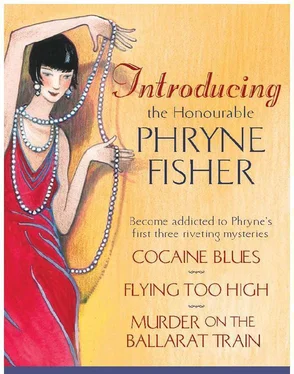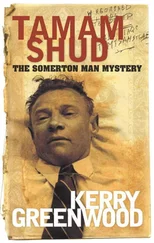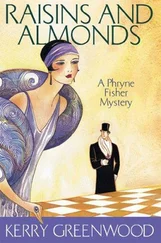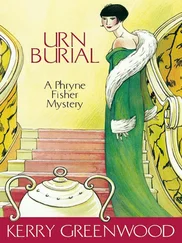‘I’m doing Arts,’ explained Marion. ‘Agnes here is doing Medicine. So is that Alastair chap, and he was rather fun, though over the last year he’s been awfully dull. Does nothing but talk about money.’
Phryne accepted some of the wine, a good traminer riesling from the Hunter Valley which she had personally selected as being light and sweet enough for a student’s taste. No glass being evident, she drank out of the bottle, sharing it with the two girls.
‘I don’t know that one,’ remarked Agnes. ‘What are the men singing?’
Behind the door, her pappy kept a shotgun,
He kept it in December and the merry month of May
And when they asked him why the heck he kept it
he kept it for a student who is far, far away
‘Far away,’ carolled the tenors, ‘Far away,’ growled the basses, ‘He kept it for a student who is far, far away.’
‘That’s a good song, we must learn it. Look here, Agnes, I think you’re right. It sounds much better with us all singing together. So much more balanced. Not shrill, like we used to sound.’
‘Ah, and you should have heard us,’ commented Lindsay from behind Phryne. ‘We growled like bears with sore heads. Now the sound is quite perfect.’
‘Not quite perfect,’ disagreed Johnson, poking his head under Lindsay’s arm. ‘There is a lot of dissonance which can be removed by rehearsal. We need to knock the raw edges off and get used to singing in time with each other. Listen. One half of the room is out of tempo with the other half.’
This was true. Someone had started the old catch, ‘My man Tom has a thing that is long,’ which the girls also knew. ‘My maid Mary has a thing that is hairy,’ they replied, but somehow got irremedially out of synch, so it was hard to tell whose thing was long and whose thing was hairy. Eventually cacophony was reached and they broke off, laughing.
‘Was that as indelicate as it sounded?’ asked Phryne, and Marion blushed. ‘It’s a broom and a broom stick.’ Phryne laughed and had another mouthful of wine. It was cold and dark outside, and the rain slanted down in sheets, but in the boathouse it was very warm, and the wine was delicious, and the singing was (occasionally) excellent. Phryne relaxed for the first time since she had left the bed with Lindsay in it, and produced a flask of cointreau.
This drink was new to many who tasted it, and it seemed to have a powerful effect. Edwards, the music student, suggested a negro spiritual, and they began to sing ‘Swing low, Sweet Chariot’. The battery of voices in that confined space, all trained to hit a note so that it went down and stayed down, was terrific. Phryne felt tears prick her eyes, as she joined in, and Marion was openly snuffling.
I looked over Jordan, and what did I see?
Coming for to carry me home
A band of Angels coming after me
Coming for to carry me home.
Before the impact of the song had time to die away, Edwards was pushed aside and the bespectacled madrigal enthusiast flourished a pile of sheet music.
‘Sops on the right, basses on the left,’ he ordered, and Phryne was left alone on the balcony.
She reclaimed her flask and sat staring out into the night, enjoying the rain, until she felt a hand slide up her calf to her knee and she covered it with her own.
‘It’s me, dear lady,’ said Lindsay’s voice from the floor, where he was lying out of sight of his fellow choristers. ‘Have you forgotten me so soon?’
‘No, dear boy, I haven’t forgotten anything at all. Come and sit next to me, or do you like it there on the floor?’
‘If they see me I shall be dragged off to sing — I like it better here. How smooth your legs are. Smoother than anything I can think of, except your thighs.’
‘You are an impudent young man,’ said Phryne, catching her breath. ‘What were you quarelling with Alastair about?’
‘Does it matter?’ asked Lindsay, laying his head in her lap. ‘Will you take me away and ravish me again tonight?’
‘Perhaps, if you merit ravishing. What was the quarrel?’
‘How tiresome you are, I shall be jealous of Alastair, you are so interested in him. If you must know, he wants to move out of my house, and he has packed up all his things. I was asking him where he was going to go, and he took me up uncommonly short and told me it was none of my business, which, of course, it isn’t.’
‘When is he to go? Stop fooling, Lindsay, this is important.’
‘Tomorrow,’ replied Lindsay, hurt. ‘I don’t know where he’s going but I think that it might not be unconnected with the not-so-blushing beauty and the money. Funny, you know, that was the night I spent in the jug.’
‘You what ?’
‘Oh, I hadn’t done anything wrong,’ protested Lindsay. ‘Old Alastair used to have spiffing ideas, you know, before he went strange.’
‘Did he?’ asked Phryne in a tone so compelling that Lindsay got up from the floor and faced her. ‘What did old Alastair suggest?’
‘Well, it was like this,’ he stammered, staring into the face of a fury, cut out of marble, with eyes of green ice. ‘He said that if I was going to be a lawyer I ought to understand about prisons, and the only way to really understand a prison is to be in one, and he said that I should get myself taken up for drunk and disorderly and be locked in overnight. Everyone gives a false name, you know. For God’s sake, Phryne, what’s wrong? What have I done?’
‘Where’s Alastair?’ she asked through numb lips, and scanned the room; an easy thing, since Alastair should have been with the tenors, and he was not there.
‘Come,’ cried Phryne. She shinned down the verandah pole, leapt and raced for her car, with the young man behind and gaining fast. Phryne threw herself into the driving seat and jabbed the self-starter. The powerful engine turned over with a roar.
‘Where are we going?’ yelled Lindsay.
Phryne cried, ‘We are going to prevent another murder — if we get there in time.’
Lindsay hung on as the Hispano-Suiza, howling on all cylinders, rocketed over the lumpy track and into the road.
Lindsay did not know that cars could go that fast. Phryne, when roused, could drive like a demon, having taken lessons from Miss May Cunliffe, the Cairo to London Road Race winner. Phryne had strong nerves and wiry wrists, and the engine of the Hispano-Suiza had been built for racing. The rain drummed on the roof and the windshield; the lights smeared as though marked with vaseline.
Lindsay hung on, cheering, exultant; Phryne clutched the wheel and bit her lip and hoped that she had guessed where the murderer was going.
After ten minutes, Lindsay said, ‘Phryne, we are going home, I mean, to your house, are we not? What do you think is going to happen there?’
‘I don’t know,’ snapped Phryne, skidding around a slow trundling truck. ‘Reach into the side pocket, will you?’
‘My God, Miss Fisher, a gun?’
‘Can you use it?’
‘Yes,’ agreed Lindsay dubiously. ‘I’ve fired one before.’
‘Good. Just try not to kill anyone with it. Now, listen. When we get to the house I want you to walk noisily down the left sideway, and I’ll go down the right. Make a lot of noise. Sing, if you like. Be genial and drunken if he is there. Hold him until help comes. Can you do it?’
Phryne felt, rather than saw, the spine stiffen and the jaw harden. There was good stuff in the young man.
‘I can do it. Why is he going to your house?’
‘Because he’s found out that Jane has seen him before.’
The car rolled to a silent halt in the cold street. Rain washed the cobbles and slicked the asphalt. Phryne buttoned her coat and pulled her cap down over her eyes, leaned over, and kissed Lindsay hard on the lips.
Читать дальше











